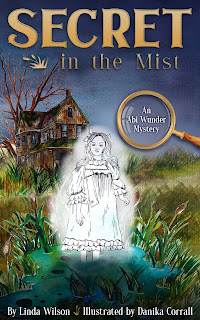 |
| Secret in the Mist: An Abi Wunder Mystery will be published sometime this year |
By Linda Wilson @LinWilsonauthor
When my critique group and I were all done discussing Chapters Seven and Eight of my WIP chapter book, Secret in the Mist: An Abi Wunder Mystery, last week, one of our members said she had a last question for me:
- Why are Abi (my main character) and Jess (Abi’s sidekick) going ghost hunting in the first place?
- Why does it matter?
- Is Abi trying to prove something to her friend, Jess?
- Is there a competition among friends?
Oh my. How could I miss showing Abi’s motivation right from the start? By the end, how could I show how Abi had grown and what she had learned if I hadn't shown her motivation for hunting the ghost in the beginning? My story needed one of the most important story elements: Theme. Without theme there is the danger of readers getting very little out of reading the book.
What is Theme?
Most storytelling experts agree that theme is one of the seven elements of a story that must exist. Theme is the main point of the story. (“The 7 Main Story Elements and Why They Matter,” by Jerry Jenkins.) Jenkins states:
Before you begin writing, determine why you want to tell this story:
- What message do you want to convey?
- What do you want the story to teach the reader about life?
The main theme in Secret in the Mist is Abi's search of "self." She leans on Jess to carry out her search for the ghost for most of the story. She believes she can't accomplish anything without Jess's help.
Common themes include courage, death, and friendship. The theme is never stated. Rather, you tell the story and through your character's quest, the theme is explored throughout the book. The reader will then discover the main point of the story on their own.
Solution
After I returned home from my critique meeting, I looked for the best place to slip in a way to answer my critique partner's questions. I needed to find a place in Chapter One to slip in Abi’s reason for wanting to hunt the ghost. In the chapter, Abi and Jess are outside in Jess’s front yard looking across the road at the marsh. In a nutshell, they’re discussing who the ghost is: a young girl who has risen out of the marsh for a century or more. That night, the conditions are just right for the ghost to appear: a full moon and perfect temperature.
The moment to show Abi's motivation came at the end of Abi and Jess's discussion:
“How are you so sure she is going to show up tonight?” Abi desperately wanted to believe Jess was right, that they were really going to see a ghost tonight.Abi figured any ghost that keeps coming back must need help. And tonight if the ghost did appear, Abi had this feeling, a feeling she couldn’t shake, that she could help her. That is, as long as Jess was by her side. She could never do a thing this big by herself.
Now I had a way to show what Abi needed to learn and how she needed to grow. Throughout the story Abi and Jess see the ghost in various settings and together go after a quest to find out who she is—was—and why the ghost has come back.
At one point, the two go their separate ways. Abi must carry out the search by herself. She discovers that she is successful at it. She realizes that she doesn’t need anyone to help her, she can figure out how to search for the ghost on her own. Armed with this knowledge, by the end she realizes that she has the ability to search on her own, but it's much more fun to be part of a team with her best friend, Jess.
In your own WIP, make sure you cover the vital glue that binds your story together: your main character’s motivation for going on their quest. When you have that, then their growth naturally flows from the intriguing adventure you’ve crafted.
Sources:
https://www.writersonthemove.com/2021/04/theme-heart-of-your-story.html
https://jerryjenkins.com
https://www.writersonthemove.com/2021/04/theme-heart-of-your-story.html
 |
| Linda's fourth picture book, Cradle in the Wild, will also be published in 2023. |
Find Linda’s books at Amazon Author Page.
Connect with Linda: Facebook, Twitter, Pinterest, Instagram





